I’m not even going to try to keep this to keep this to 1000-ish words, because I came up with this last week when I was on a cruise and had no ability to vomit it out on paper, so it’s just been marinating in my head and growing bigger and bigger as it goes. But it also means I’m excited to get this all down.
Once again,
I get to write about Dungeons and Dragons, because I had a really interesting
revelation recently. I’ve written before
about how “conditioning is magic”, and it’s an interesting thing for me to say
when I am very much AGAINST magic when it comes to the world of Dungeons and
Dragons. Ultimately, magic is just too
complicated for me, and I don’t have fun playing magic users for that very
reason. Instead, I am always drawn to
the Barbarian, because they are a VERY simple class to play: they simply hit
harder and are tougher than the other classes, to include the Fighter class, at
least at the most basic level (more on that later). So why would I go on to say that conditioning
is magic, if I hold magic in such low esteem?
And why, in turn, would I equate barbarism with magic in a similar
way? Because as we just observed: the
Barbarian is a class you can choose INSTEAD of a magic using class…which
indicates to us, the player, that what magic is for the magic user, barbarism
is for the barbarian. Barbarism IS the
barbarian’s magic.
Let’s talk
about those magic users, because there’s a lot to learn there. I’ve written extensively about them in my
“Dungeons and Diets” series, but for a recap: there’s ultimately 2 different
kinds of magic: arcane (black) magic and divine (white) magic. The prototypical arcane spellcaster is the
wizard. The wizard gains their
spellcasting ability through EXTENSIVE study of dusty tomes and ancient scrolls
and all other books arcana. The amount
of time vested in cultivating this knowledge and skillset is reflected in the
AGE of a wizard: they start the game older than anyone else, because all the
other classes acquire their basic skills much quicker. One of those classes are the users of divine
magic: the clerics.
Whereas
wizards gain their magical ability though extensive study and research, clerics
receive their spellcasting ability by gaining the favor of their god/deity. They dedicate themselves not in study, but in
worship and prayer, and for their loyalty and faith, they are gifted the
ability to employ divine spellcasting.
Whereas the arcane spellcaster is granted arcane magic for their efforts
(fundamentally destructive magic), the divine spellcaster is granted “white
magic”: healing and blessings they can impart upon the party. And, of course, you true nerds out there are
already upset with me because I’ve summed this up to the point that it’s not
really accurate, but for the sake of telling this story allow me to rush just a
little bit.

I can feel the nerd rage through my monitor
Both of
these spellcasters have magic as their ability.
So what is the barbarian’s “magic”?
Barbarism! The barbarian does NOT
engage in extensive study, so much so to the point that barbarians are the
YOUNGEST characters in the game when they play.
They have also NOT been granted any sort of unique ability from the
gods, which Conan the Cimmerian author Rob E. Howard perfectly captured when he
wrote “What use to call on [Crom]?
Little he cares if men live or die.
Better to be silent than to call his attention to you; he will send you
dooms, not fortune! He is grim and
loveless, but at birth he breathes power to strive and slay into a man’s
soul. What else shall men ask of the
gods.” How about some divine
spells?! But no, that quote is actually
perfect for discussing the barbarian’s magic of barbarism, for it is that very
power that defines what sets the barbarian apart.
The majority
of the barbarian’s advantages are PASSIVE rather than active. Whereas a spellcaster has to cast a spell,
the barbarian simply has to BE a barbarian.
They naturally move faster than other classes, they naturally roll more
hit points per level than other classes, which is combined with a natural
ability to absorb damage, making them tougher, they naturally are able to sense
traps, avoid ambushes/backstabs, etc.
Their only real “active” ability is the ability to enter into a rage,
and even then, once the rage IS active, the bonuses it grants are passive: the
barbarian’s strength and constitution (stamina/hit points) increase and they
gain immunities to mind altering magic.
All this does is simply make them better at what the gods granted them:
the power to strive and slay. And rest
assured: they are QUITE talented at striving and slaying.

It's really a pretty awesome thing to be good at
But…here’s
“the thing”. The character classes are
SUPPOSED to be balanced. If there was
simply one flat out superior character class, EVERYONE would just pick that one
and the game wouldn’t be very fun due to a lack of diversity. It means that, when the game designers were
designing these character classes, THEY decided that a barbarian’s barbarism
was EQUAL to a spellcaster’s magic. From
that, we determine that barbarism IS, quite literally, magic. A spellcaster has magic and a barbarian has
barbarism, and these equal each other to make these balanced across the playing
field. It would be UNFAIR for the
barbarian to have magic…just like it would be unfair for a spellcaster to have
barbarism.
But here is
the OTHER thing: BECAUSE the creators of Dungeons and Dragons present the
classes to the player in alphabetical order in the “Player’s Handbook”, that
means that a player’s FIRST exposure to ANY character class ends up becoming
The Barbarian. They come before the
Bard, before the Fighter, before the Cleric, before the Wizard, etc. The Barbarian becomes the baseline for which
the other classes are compared AGAINST.
It means that a player is first exposed to the idea that a character is
given the power to stride and slay, and from there, in the absence of this
power, magic is given as a form of COMPENSATION. “We’re so sorry that your wizard is NOT a
barbarian: here is some magic to make up for it.”
The magic won't help with the teasing though
What does
ANY of this have to do with physical transformation? Honestly, the creators of Dungeons and
Dragons gifted us with an OUTSTANDING allegory and metaphor to be able to
understand this process. Between the
wizards, clerics and barbarian, we have all the facets of physical
transformation covered: knowledge, gifts, and barbarism, or, to put more
succinctly: effort. For that,
ultimately, is what barbarism is: simply trying HARDER than the other classes
to achieve what Crom has breathed into us: the spirit to strive and slay. A barbarian will swing the club harder, will
run faster, will withstand more abuse, and will just simply fight harder than
the other classes. “That’s my
business. That’s what I do.”, to quote
Nicky Santoro in Casino. And with THIS
understanding, let’s analyze exactly what we can learn from this metaphor.
Well let’s
keep exploring this metaphor. If the
Barbarian is effort, what is the Wizard?
The Wizard is knowledge: the Wizard’s power comes through extensive
study and practice. What do we OBSERVE
with the wizard? At low levels: they
die. They’re ALWAYS dying. They have TONS of knowledge and lots of
POTENTIAL…but it hasn’t been realized yet.
They can only be SO powerful with that knowledge: what they NEED, now,
is experience. And in DnD, it’s quite
amazing how literal that demand is, because you acquire “experience points”
through killing monsters and completing quests, and through that accumulation
of experience you eventually level up, grow more powerful, and realize more of
your potential. All that knowledge can
FINALLY be applied, ONCE we have enough experience to do so.

Bruce Banner might be one of the smartest beings in the universe...but the Hulk knows how to be big and strong better
What of the
cleric? The cleric is, quite literally,
blessed: they personify genetics. Some
of us WILL be blessed by the gods in our pursuit of physical
transformation. Some of us will respond
rapidly and well to training and nutrition, and some of us will have much
greater potential than others as a result of these blessings. …and some of us won’t. Some of us may simply be doomed from the
start. No blessings whatsoever. Clerics will ALWAYS be in the party, because
we always need them, and either we are them or we aren’t. What do we take from this? If you ARE blessed, then be blessed: be the
cleric of your party and maximize that potential to the greatest extend
possible. Go fill the role that the gods
have granted you: that of the blessed.
But you know who DOESN’T get a divine blessing? Who DOESN’T get spellcasting abilities from
the gods? Who is only given the will to
stride and slay? The Barbarian.
The
Barbarian is effort personified. Effort
is ALL the barbarian brings to the fight.
With that effort comes tenacity, toughness, brutality, endurance, etc,
but all these are simply manifestations of a being that survives PURELY as a
result of the effort they put out. And,
in turn, surviving is what the barbarian thrives at. Whereas wizards die off by the score at the
start of the adventure unless they have a meat shield to protect them, the
barbarian IS that meat shield! The
barbarian is so tough as a result of his effort that not only can HE survive,
but he can survive for OTHER PEOPLE.
Often, a party without a thief to check for traps will simply send the
barbarian ahead so that they can soak up the damage from the trap and spare the
party the harm. They occupy the front
lines of the battlefield and present such an enticing target for the enemy by
wearing minimal armor and displaying reckless disregard for their own welfare
that the rest of the party can rest easy in the background, preparing spells
and distance weaponry while the Barbarian simply excels at what they excel at:
trying harder than everyone else around them.
And as the game goes on, and the party gets more experienced, levels up,
and unlocks their abilities, the barbarian DOESN’T change: they still just keep
trying harder and putting in more effort than everyone else. While the fighter learns more tricks, while
the monk gains superpowers from ki, while the Paladin eventually becomes more
blessed, while the Ranger is granted powers from nature, the Barbarian just
continues swinging the club harder and absorbing damage better.

It sounds stupid until you realize it actually makes you a demi-god
What do we
learn from this? Effort is the
CONSISTENT variable for physical transformation. Effort ALWAYS works. Is it always the ONLY answer? No.
Much like how a barbarian can become “outclassed” by a high level wizard
or cleric, there can certainly be a point where more knowledge is necessary to
progress, or where we simply need to be better blessed if we wish to progress
forward, but the absence of this effort will absolutely doom us: it needs to
ALWAYS be there. And “always being
there” means from the START. Much like
how a level 1 barbarian will survive the journey to level 2 with greater ease
than the low level wizard, the trainee who simply works hard diligently is
going to progress with much greater ease than the trainee who tries to
out-think the training from day 1. The
trainee that is able to COMBINE that effort with knowledge as they progress in
experience will be able to progress even further, which, for you nerds out
there, totally get how I just described “multi-classing” in DnD: start out as a
barbarian, gain experience, level up and take levels in Wizard, creating some
sort of terrifying hybrid that can MAXIMIZE that knowledge by combining it with
effort: a barbarian that can cast some sort of “enhance strength” spell on
themselves before raging and getting even STRONGER.
And once
again, recall how the barbarian is our FIRST exposure to characters in DnD: so
too must effort be our FIRST experience in the realm of physical
transformation. We simply need to TRY
something and try it hard and learn from that experience of effort. When I engaged in my first bout of physical
transformation at age 14, I had no knowledge, and I certainly had no blessings:
I was a lifelong fat kid that decided I didn’t want to be anymore. I cut my food portions to a third of what I
was eating before and worked my way up to 200 push ups and 200 crunches a
night, along with running daily, gradually working up to a casual 8 miles a
day, EVERY day, alongside all sorts of other physical activity before I saved
up enough money for a weight bench so I could bench and do preacher curls every
day. Was ANY of that well informed? Hell no!
But the effort was there, and I lost 25lbs over the summer and
completely transformed myself through sheer stupid barbaric effort. Over time, I gained experience, developed
knowledge, and found out WHAT my blessings were (I am effectively farm
machinery granted sentience and build solely to deadlift), but NONE of that
could have occurred without the effort having ALWAYS been there from the start.
And it’s
because barbarism IS magic. And unlike
the arcane or divine arts, it’s magic that we are FULLY in control of. In a world of fantasy, where magic is real,
barbarism EQUALS actual motherf—king magic: just IMAGINE the significance of
that in our “real world”, where magic is an illusion but effort is real? You HAVE access to magic: go do something
incredible with it.



I've started training with my fiance and after teaching her proper form, I've been trying to make effort the main variable we work on. We've been doing 5s PRO with a FSL AMRAP set at the end. This week she hit the FSL weight for 21 reps on trap bar pulls. It's very cool seeing someone learn how to find that inner barbarian and just push through the set. I'm very proud of her.
ReplyDeleteThat's so awesome to hear dude! You can read all the books you want: nothing can replace KNOWING how to grind like that.
DeleteSpeaking of books, have you read/heard of Secrets of Giants by Alyssa Ages? It's about what drives people to compete in strength sports and how strength sports help with personal grown. Highly recommend.
DeleteI haven't, but I will have to look out for it!
DeleteAs far as "D&D as training metaphors" go, I really like the idea a singular trainee being an entire party of adventurers unto themselves:
ReplyDeleteOther than the trainee needing willpower, exercise science knowledge, and genetic blessings that you've covered, there's also:
Fighters: Knowing exercise technique and increasing mastery of exercises and movements
Rogues: Figuring out shortcuts, hidden passages, and avoiding traps in one's lifestyle that get in the way of gains
Bard: Learning how to have fun in one's training process and not get too bogged down in seriousness, and giving oneself useful situational mental boosts, often with music
Paladin: Commitment to an oath, such as "I am going to improve my health and body with X y z, no matter how hard it gets" or "I am going to become the best powerlifter/bodybuilder/strongman I can be"
Monk: The ability to train without ideal or even any equipment
Sure not all of them are necessary if the quest is just physical transformation, but the higher the stakes, the bigger the party should be
I love this! Excellent way to extend the metaphor.
DeleteI havent yet finished this due to lack of time, but going through the book "easy strength", and i came across this line roughly the same time i saw this blog post.
ReplyDelete-- Or, as Dick joked literally daily, “One who lifts the heaviest weights gets the strongest.” --
That resonated with me. Its such a simple, easy statement, yet so maby people seem to be trying to out knpwledge the weoghts into getting stronger, rather than just putting in the time and effort needed to succeed.
Grsnted, there is some personal bias here, but i dont know why anypne would be in the gym if the goal wasnt to be as big and strong as possible.
I will say that my goals have changed from that recently, which is why I write on physical transformation rather than just getting bigger and stronger, but I can still appreciate Dan there. Are you reading the Omnibook or the Easy Strength book he wrote with Pavel?
DeleteAbsolutely. Strength, or physical transformation, both require pushing the envelope of what is possible.
DeleteI am reading the omnibook. Je does mention writing something with pavel in the book.
Also, while I have generally enjoyed the wizard/sorcerer in DND, the barbarian is actually pretty cool to play in games like Diablo 3 or Path of Exile, because they just exude all the qualities you talk about in this post, and they're also rather fairly simple to play.
ReplyDeleteHit hard, take damage, and just do more of that. Ad infinitum.
WoW's fighter class is much the same way. Honestly, if your DPS is high enough you don't even need to tank.